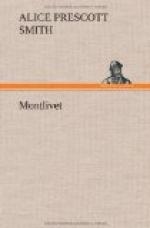“There is no danger,” I said, with stupid brusqueness. “I am over-anxious. I bid you good-night, madame.”
I went to the Malhominis with haste pushing me, for I hoped for news of Starling. I pressed forward, yet I recoiled. There would be cross-threads to untangle when I met my wife’s cousin.
It was wonderful voyaging to the Malhominis. Their village was near the mouth of a river, and they were close bound with great rice swamps that gave them their name. Our low canoe burrowed through a tunnel of green as we nosed our way up to their camp. Birds fluttered in the tangle, and fish bubbled to the surface under our paddles. I did not wonder that I found the tribe as well fed as summer beavers. But I learned nothing from them. They were a good-natured people, as running over with talk as idle women, and they assured me that I was the first white man they had seen since the moon of worms. We talked of the Huron situation at Michillimackinac, but they said nothing of having seen a warrior of that tribe, so I made sure that Pemaou had not been with them. I swallowed relief and disappointment. They said that a small company of Sacs was encamped to the north, and that Father Nouvel was with them. So after a few days I went on.
A waft of fetid air on a hot day will bring the smell of that Sac camp to me even now. The Sacs were a migratory, brutish people, who snatched at life red-handed and growling, and as I squatted in their dirty hovels, I lost, like a dropped garment, all sense of the wonder and freedom of my wilderness life. Suddenly all the forest seemed squalid, and a longing for the soft ease and cleanliness of civilization came on me like a wave. But I hid the feeling, and lingered, though my welcome was but slight. Even my small cask of brandy failed to buy their smiles, and it was only when I talked of war that they listened. They were a useless people on the water, for they could not handle canoes, but land warfare was their meat. So I talked long.
I found Father Nouvel among them, his delicate old face shining white and serene amid their grime. I fell upon him eagerly, but he could tell me nothing. He had left the Pottawatamies the day after the wedding, and had heard no rumors of any Englishman. I did not take him into my confidence. He had outlived the time when the abstract terms “ambition” and “patriotism” had meaning to him. The story of my hopes would have tinkled in his ears like the blarings of a child’s trumpet. But in one matter he questioned me.
“Your wife,—should you not have brought her with you, monsieur?”
I felt piqued. “But her comfort, Father Nouvel!”
He looked me over. “I think somehow that she would prefer your company to her own comfort,” he said, and when I did not answer he looked troubled. When he bade me good-by, he spoke again.
“Your wife came strangely near my heart. You are giving her a hard life. You will be patient with her, monsieur?”




